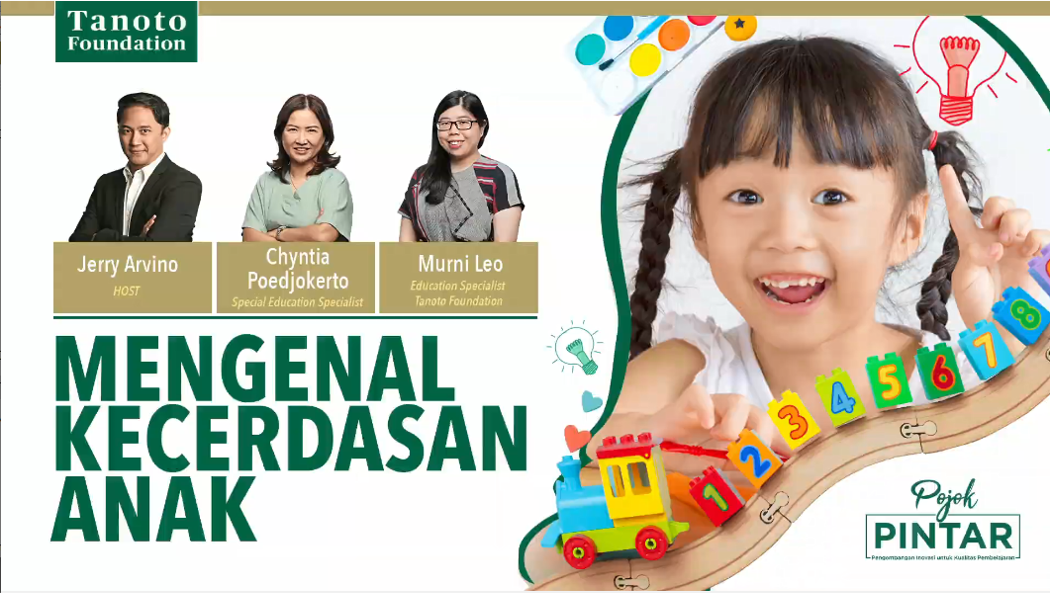Pojok PINTAR #3: 3 Ways to Develop Your Child’s Intelligence

Pojok PINTAR is a casual talk show that discusses various topics related to the development of Basic Education in Indonesia. The program is hosted by Tanoto Foundation, an independent family philanthropy organisation founded by Sukanto Tanoto and Tinah Bingei Tanoto in 1981.
All parents want the best for their children. Often this involves trying to develop their intelligence, whether that means playing classical music to them in the womb or reading stories to them once they’re born.
But, do these methods really work? What do parents need to do to help their children develop?
In the third episode of Pojok PINTAR our host Jerry Arvino asks these burning questions to Chyntia Poedjokerto, Special Education Specialist from Wellness Institute, and Murni Leo, Education Specialist from Tanoto Foundation.
This episode discusses:
a. What is intelligence in children?
b. How to create an environment that supports children’s intellectual development?
c. How to maintain a balance between children’s IQ and EQ?
Understanding Intelligence in Children
Simply put, intelligence is the ability to absorb information and apply that knowledge in everyday life. Intelligence in children allows them to learn quickly and provides them with curiosity about the world around them.
Parents do not need to worry about their children intelligence as Chyntia said that every child is born intelligent, meaning that each child was born with the natural ability to learn and explore their surroundings.
What parents need to do is to support their children’s intellectual development. Here are some of the ways to do that.
Establish Good Communication with Children
Parents need to establish a good communication pattern with children as it would help to form a good relationship in a family. Besides communicating well with children, parents should also establish certain rules and routines to make their children feel safe in their environment.
Chyntia said that a structured environment at home will help children to feel safe, giving them the confidence to explore their surroundings and develop their intelligence.
Embrace each child’s uniqueness
Each child is unique, and we can’t treat them all the same way. Imagine we tested monkeys, elephants, fish and birds in the same way? Suppose they all are tested to fly – birds will win every time, but it neglects all the animals’ other skills. The same thing goes for children: each child is different. Therefore, parents should avoid limiting their children by putting them in boxes.
Chyntia shared that many parents assume those who excel in maths will be successful in life, but sometimes the opposite is true. Each child has his or her intellectual capacity.
Murni also agreed with Chyntia, saying that many parents believed they need to excel in a particular subject to help their children learn. “The role of parents here is to motivate their children,” said Murni.
That being said, the speakers stressed that it is important for parents to embrace children’s uniqueness and find the most suitable approach to help each child realise their full capacity.
Balancing IQ and EQ
As well as IQ, the speakers also discussed the importance of Emotional Intelligence, or EQ.
IQ and EQ are inseparable. “IQ helps someone to get a job, but EQ helps them to keep the job,” explained Chyntia. Therefore, it is parents’ job to help children in balancing IQ and EQ.
One of the ways to balance children’s IQ and EQ is by involving them in a discussion. Parents can share the struggles they face as a family and invite children to solve the issues together. This method can help children to hone their critical thinking as well as emotional regulation.
Get to know more http://bit.ly/MengenalKecerdasanAnak

Leave a Reply